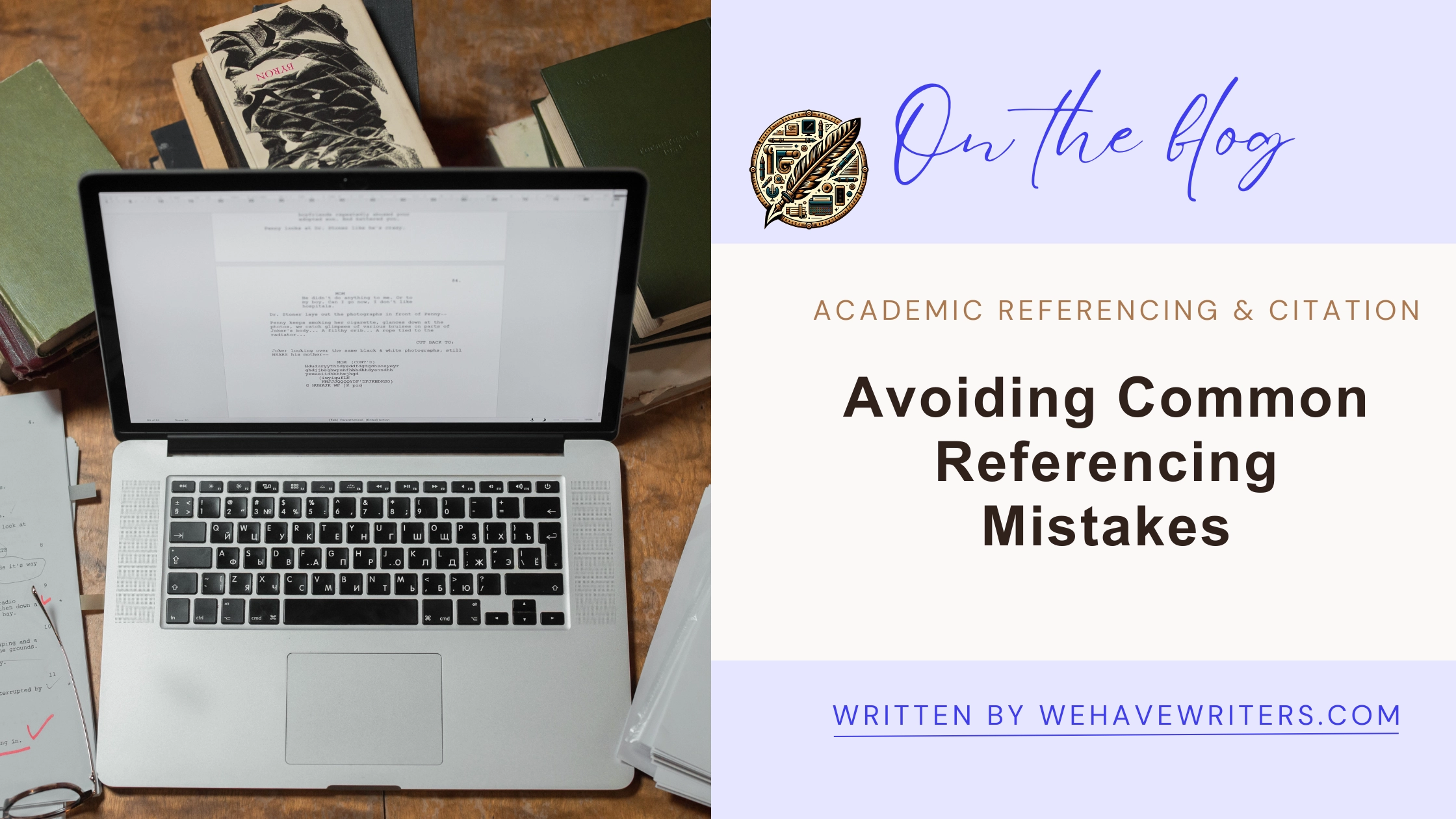
Introduction
Academic referencing is essential in scholarly writing. It supports your arguments, credits original authors, and helps readers locate your sources. However, many students struggle with citation practices and unknowingly commit referencing errors. These mistakes can result in plagiarism, poor grades, and loss of credibility..
This article identifies common referencing mistakes and offers practical strategies to avoid them. Whether you’re using APA, MLA, Harvard, or Chicago style, the principles discussed here will help you cite sources accurately and consistently.
Why Referencing Matters
Referencing is not just a formality. It:
- Acknowledges original authors
- Shows research depth
- Avoids plagiarism
- Supports your academic credibility
To achieve these outcomes, you must apply referencing rules correctly. Let’s explore where students often go wrong.
1. Inconsistent Citation Styles
Mistake: Mixing different referencing styles in one document.
Example: Using APA for in-text citations and MLA for the Works Cited list.
Fix: Choose a single referencing style based on your field or instructor’s guidelines. If you’re using APA 7th edition, follow it throughout your paper, including in-text citations, reference list, headings, and formatting.
Tip: Use a style guide or citation tool that supports your chosen style-
2. Missing In-Text Citations
Mistake: Including a source in the reference list without citing it in the body of the text.
Fix: Every source in the bibliography must appear at least once in your paper as an in-text citation.
Tip: Cross-check your paper and reference list to ensure all sources are accounted for.
3. Missing References in the Bibliography
Mistake: Citing a source in-text but failing to include it in the reference list.
Fix: All in-text citations must be accompanied by a full reference in the bibliography or Works Cited page.
Tip: Use citation management tools like Zotero or Mendeley to track sources automatically.
4. Incorrect Author Formatting
Mistake: Misplacing author names or incorrectly formatting multiple authors.
Examples:
- APA: (John Smith and Laura Green, 2020) instead of (Smith & Green, 2020)
- Harvard: using initials instead of full names or vice versa
Fix: Follow style-specific rules for listing one, two, or multiple authors.
Tip: Refer to official style guides for author formatting.
5. Improper Use of “et al.”
Mistake: Using “et al.” incorrectly or prematurely.-
Fix:
- APA: Use “et al.” for three or more authors after the first citation.
- MLA and Harvard: Rules vary; check style-specific guidelines.
Tip: Always include the first author followed by “et al.” when applicable, and punctuate it correctly.
6. Overusing Direct Quotes Without Citations
Mistake: Quoting directly from a source without citing it.
Fix: All direct quotes must include quotation marks, author name, and page number (if available).
Tip: Paraphrase when possible and always cite the original source.
7. Missing Page Numbers
Mistake: Not including page numbers when required (especially for direct quotes).
Fix:.
- MLA: Always include page numbers for quotes.
- APA: Required for direct quotes.
Tip: If quoting an online source without page numbers, use paragraph numbers or section headings when available.
8. Citing Secondary Sources Improperly
Mistake: Citing a source you’ve only read about in another author’s work without proper attribution.
Fix: Always clarify that you’re using a secondary source.
Example (APA): (Smith, 2005, as cited in Jones, 2020)
Tip: Whenever possible, find and cite the original source directly.
9. Incorrect Capitalization and Italics
Mistake: Inconsistent formatting of titles, capitalization, and italics.
Fix:
- APA: Capitalize only the first word of the title and subtitle; italicize book and journal titles.
- MLA: Use title case and italicize long works.
- Harvard: Italicize titles of books, reports, and journals.
Tip: Refer to formatting guidelines for your citation style.
10. Using Unreliable Citation Generators
Mistake: Relying on citation generators that produce inaccurate citations.
Fix: Double-check all auto-generated citations against the official style guide.
Tip: Use trusted tools like Zotero, EndNote, or the Purdue OWL citation guide.
11. Failing to Update Broken URLs
Mistake: Citing sources with outdated or broken links.
Fix: Always verify URLs before finalizing your references. If a source has moved or changed, look for the updated location or use a DOI…
Tip: For APA and Harvard, include a DOI when available.
12. Ignoring Institutional Guidelines
Mistake: Using the standard referencing format without checking your institution’s preferences.
Fix: Many universities have specific citation rules or preferred versions of referencing styles.
Tip: Review your course handbook or check with your academic advisor for specific requirements.
How to Avoid Referencing Mistakes
- Plan Early: Start collecting source details from the beginning of your research.
- Stay Consistent: Stick to one referencing style throughout.
- Use Reference Tools: Software like Zotero, EndNote, or Mendeley can reduce manual errors.
- Review the Style Guide: Always cross-check against the official guide (APA, MLA, Harvard, etc.).
- Proofread Carefully: Don’t treat referencing as an afterthought. Review your citations for formatting, completeness, and accuracy.
Conclusion
Avoiding referencing mistakes is crucial for academic integrity and the overall quality of your work. Whether you’re using APA, MLA, Harvard, or another style, follow the rules consistently. Always cross-check your citations and reference list for accuracy.
Mastering citation practices shows attention to detail and strengthens your academic writing. For more referencing tips, citation guides and writing help Contact Us!
Keywords: referencing mistakes, common citation errors, how to cite sources, avoid plagiarism, APA citation errors, MLA citation guide, Harvard referencing tips, academic referencing, citation style mistakes, referencing guide.
